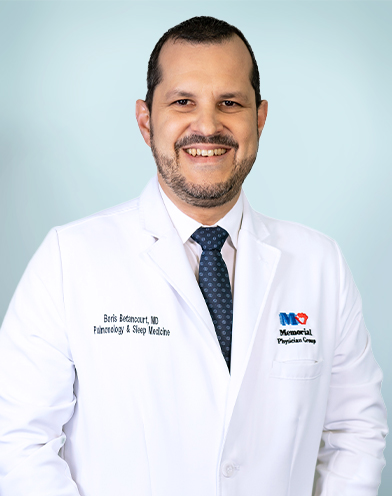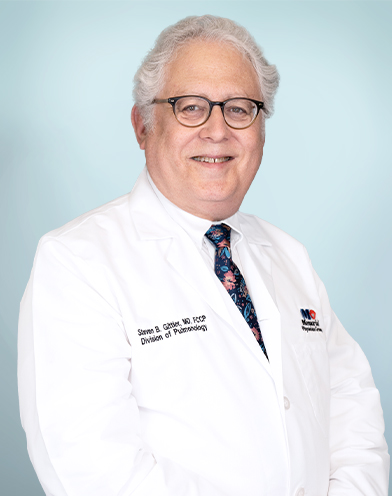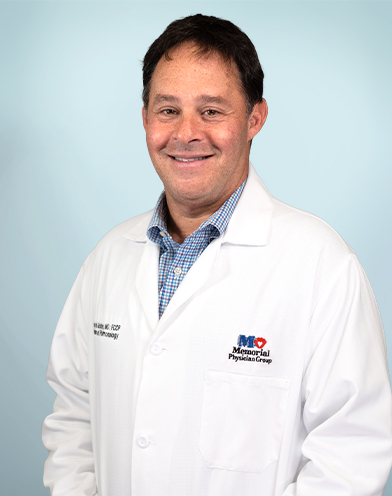Respiratory Disorders
Explore Respiratory Disorders We Treat
To Schedule a New Appointment or a Follow-Up Visit, Call:
954-276-1925Respiratory disorders can cause shortness of breath, a cough that won’t go away, wheezing and pain with breathing. You may feel like you aren’t getting enough air, or perhaps you cough up blood or mucus.
Over time, lung disease can deprive your body of the oxygen it needs. It can stop you from doing the activities you enjoy, even prevent you from performing basic tasks.
The experienced pulmonology team at Memorial Healthcare System can determine what is causing you to have trouble breathing. Our specially certified physicians work with a respiratory therapist to develop comprehensive, personalized treatment plans. Their goal is to relieve your symptoms and improve your quality of life.
What conditions do you diagnose and treat?
COPD/emphysema an inflammation and obstructed airflow in the lungs.
Asthma is a chronic inflammation of the airways that makes breathing difficult, especially when exacerbated by allergies or other irritants.
Pulmonary fibrosis is scarring of the lungs that causes shortness of breath and dry cough.
Pulmonary hypertension or high blood pressure in the blood vessels specifically in the lungs.
Spots or shadows on the lungs, which may be benign (not cancerous) lung nodules or lung cancer.
Lung Infections, such as tuberculosis (a bacterial disease that usually affects the lungs) and pneumonia (a condition resulting from the lung’s air sacs fill with fluid or pus).
Bronchiectasis is a condition that occurs when the walls of the airways thicken because of chronic inflammation or infection.
To Schedule a New Appointment or a Follow-Up Visit, Call:
954-276-1925Diagnosing Lung Disease
Precise diagnosis leads to better treatment and outcomes. We use leading technology to identify the exact cause of your respiratory disorder. The following diagnostic tests are available on-site:
- Imaging technology to take pictures of your lungs and heart (X-rays, CT scans and PET scans, echocardiogram).
- Spirometry, which measures how much air you inhale and how much, and how quickly you exhale.
- Right heart catheterization, which measures how well your heart is pumping and the blood pressure in your heart and lungs.
- Bronchoscopy, a procedure that enables a doctor to examine the inside of the airways and lungs.
- Sputum culture, which tests fluid in the lungs and airways to identify bacteria or fungi.
- Allergy testing and blood work.
- Radiology-guided biopsy, which tests tissue to determine whether it is cancerous or infected.
Treating Lung Disease
After diagnosis, we work with you to tailor a comprehensive and individualized plan. Treatments may include:
- Oxygen therapy: A tube resting in your nose or a face mask delivers extra oxygen for you to breathe. Oxygen can come from equipment at the clinic, or you may be prescribed a tank to carry with you.
- Medications to open the airways and clear mucus: These may include inhalers, steroids and biologic therapies.
- Vaccines and carefully designed antibiotic strategies.
Every plan also includes education and support to help you learn to breathe better in your everyday life:
- Breathing and relaxation techniques
- Exercises and procedures that help clear airways of mucus
- Proper inhaler technique
- Strategies and exercises to improve lung function
- Weight management and smoking cessation
To Schedule a New Appointment or a Follow-Up Visit, Call:
954-276-1925Respiratory Therapy On-Site

Exercise is essential to improve lung function, but traditional gyms may be intimidating to patients who have trouble breathing. We offer a unique on-site pulmonary rehabilitation clinic. In this special “gym,” a respiratory therapist coaches patients how to exercise and improve breathing capacity in a safe, supportive environment.
Partnerships for the Most Complex Cases
Some conditions require collaboration with other medical specialists. Our pulmonologists have established partnerships with:
- Memorial Healthcare System oncology service for cancer treatments, including chemotherapy, radiation, CyberKnife® and immunotherapy.
- Jackson Health System’s Adult Lung Transplant Program
- Memorial Healthcare System Thoracic Surgery for bullectomy (surgery to remove damaged air sacs in the lungs) and resection (surgery to remove damaged or diseased lung tissue).
- National Jewish Health in Colorado for complex cases of bronchiectasis.






